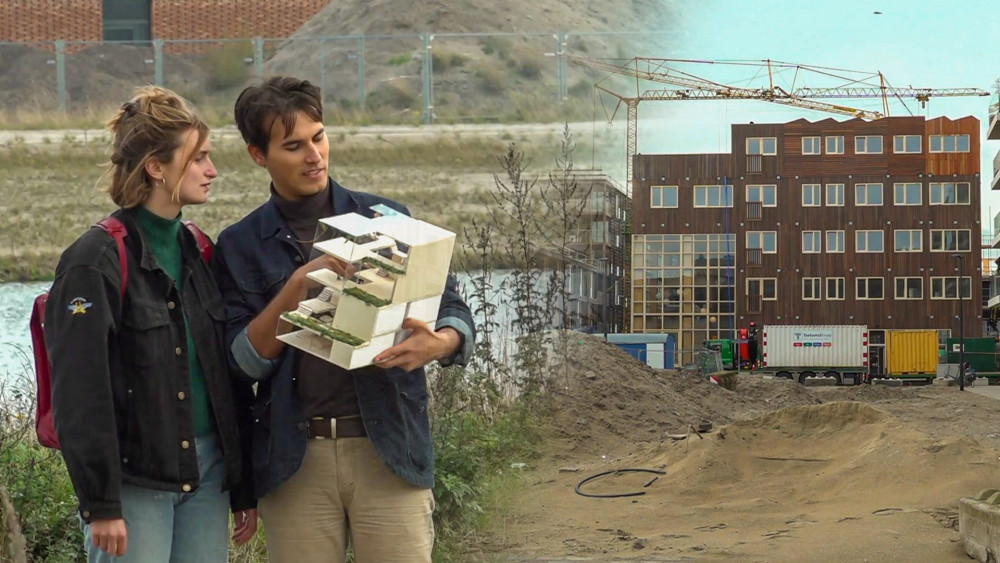Design, build and rent your dream home with a group – housing co-ops are on the rise in the city. At De Warren, the first newly built housing cooperative in Amsterdam, members have put the finishing touches on the interior. Other housing associations are struggling with sharply increased interest rates and building costs. “It’s really groundbreaking, the paths we’re blazing now aren’t there yet.”
Hopefully, Chandar van der Zande can celebrate Christmas together with about fifty friendly members of the De Warren housing cooperative in their self-designed house on Center Island in IJburg. More than five years ago, their dream began to start the first newly built housing cooperative in Amsterdam. A house that they themselves have designed as a group of friends, financed and that they will soon be renting out to themselves.
And this life form is on the rise. Clemens Mol of the !WOON Foundation sees more and more initiatives like this being born in the city. “At the moment there are about 20 groups active in all types of neighborhoods in different compositions, from students to seniors,” he says. “I think De Warren has inspired new groups and the housing shortage calls for new initiatives. Council also encourages this form of housing. There is a loan fund, council has awarded five new lots to cooperative housing this year housing and therefore wants to do in 2040 ten per cent of all new construction is made up of cooperative housing projects”.
Benjamin Caton is one of the promoters of the De Torteltuin housing cooperative. A club of 25 young people between the ages of twenty and thirty, with a plot on Center Island who would like to start building their green and sustainable home next year. Cato he started the project because he was looking for more social connections, but also because he is simply looking for a house in the city. “I’ve lived in thirteen different houses over the past five years,” she says.
Laura Schefold, also from Torteltuin, adds: “I think we all notice that the city is no longer for the ordinary city dweller. It is almost impossible to find a home and there is just no room for nature.” Was the idea born out of desperation or idealism? “Both,” they say.
In the Eureka housing cooperative in the Kolenkitbuurt, future residents are aged between 2 and 92. “It was originally a club for and by senior citizens,” says Bernice Siewe. “While searching for more members, we said goodbye to that idea. But as we get older, we’ll look at how we can jointly buy care like pedicures, physios or home care. We also want to encourage residents to stay active and for their commitment in the group, for example by working in the garden, they receive a reduction in rent.
According to Mol, Amsterdam is a pioneer in the Netherlands, but private housing cooperatives are already much better known in other countries. “In Germany, for example, 2.2 million houses are owned by housing associations and in a city like Zurich this is 20% of all houses,” he says. “It ensures that you can continue to offer rental properties. The houses stay in the possession of the residents and that’s why they remain affordable. The residents don’t need to raise rents, because there’s no profit motive.”
But it will be some time before the construction of Torteltuin and Eureka can begin. Housing cooperatives are currently facing a number of problems. “Interest rates are skyrocketing and construction costs are rising,” says Mol. “This is a bottleneck that applies to all new construction projects, but it is even more difficult for housing associations. It is still a relatively unknown phenomenon for banks. For example, it sometimes takes six months before you can even open a housing association account, and its many banks are reluctant to give a loan.”
As a result, Torteltuin has now suffered a delay of almost a year and a gap of around four million euros. Due to rising interest rates, they can no longer complete their original budget and the letter of intent from the bank they had for the loan is no longer valid. Schefold: “Now we have to look for alternative ways of financing, such as crowdfunding, even more grants or bond issuance.”
pioneers
At De Warren, all members have now asked for two weeks off for the final stretch like sanding, whitewashing, laying floors and building planters. “If we had to outsource that too, we would have gone bankrupt,” Van der Zande says with a laugh. “I’m really, really proud of how far we’ve come. We had to come up with a lot ourselves. From finances to technical and legal hurdles. It was really groundbreaking. pension raised our figure of 7.5 million. I hope we have created a path in the jungle, which future housing associations can soon cross as a beautiful two-lane road.”
💬 Whatsapp on!
Do you have any recommendations? Or did you make an interesting photo or video? Send us your news 0651190938!


